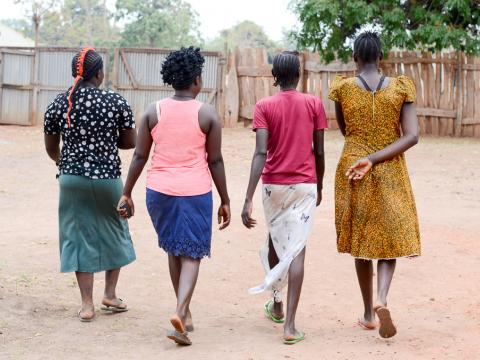A #MeToo movement in South Sudan

South Sudan's conflict is taking a tremendous toll on women.
The stories are repeated over and over in this town in the former Western Equatoria State. On this scorching Saturday morning, more than 30 women gather under a mango tree to share their experiences.
As many as half of the women and girls in the country have experienced some form of gender-based violence within the last year, according to data collected by the International Organization from Migration (IOM) in 2017. The issue of sexual violence against women and adolescent girls is sweeping, and occurs in most cases with impunity.
The tales are heart wrenching.
“When there was an attack at our village, I had to run with my small children. When we were running, a man who was a soldier saw me and he caned me. I fell down. After, he started to kick me and slap me. Then he started to rape me.
“The children were screaming as they watched this. After, he finished and he ran and left me. After a month, I realized I was pregnant. When I went to the hospital, I found I was [HIV] positive,” narrates 35-year-old Lona*.
Jennifer*, a 26-year-old mother of five, experienced similar brutality.
“The men who raped me, I can’t identify them but they were in uniform. I don’t know what tribe they were from. They covered my husband’s face with a cloth. After that, they slapped him and then they started to sleep with me. One came after another,” remembers Jennifer, whose husband was later killed by her attackers.
Twenty-seven-year-old Susan* witnessed the death of her husband and other men in her village before she and other women were attacked.
“They started to sleep with us. After that, they let the other women run. But I couldn’t run because my leg has a problem. After, they put another child in my stomach because of that raping,” Susan says quietly.
Mary Peter Pio, a 30-year-old volunteer, brought the women together after joining a World Vision project aimed to reduce the stigma experienced by survivors of sexual violence and their children born from rape.
Mary, along with over 20 other women’s leaders create safe spaces for women to tell their stories as a means of healing, and for those who wish, to help become advocates, raising awareness, supporting community prevention initiatives and ending the social ostracism so many survivors still experience.
“We conducted awareness campaigns in various communities and tried to help people learn about SGBV (sexual gender based violence). During those events, several women stood up and said, ‘this happened to me’. I took their number, and we started to meet,” Mary explains.
Other activities organized included organizing radio call-in shows and football matches where anti-gender based violence messages where shared.
Training with faith leaders promoted non-violent conflict resolution skills and counseled families who experienced or witnessed violence and to help reduce stigma that can start with a survivor’s own relatives.
“There was a lot of unawareness about where to get help after these traumatic events, a lot of people isolated themselves because they felt a sense of shame,” Mary articulates.
Mary and the other volunteers were particularly concerned when they learned many of the survivors of sexual violence had children as a result of those assaults.
Women were struggling to provide for the children’s basic needs and facing a new form of hostility.
“Where I’m staying people were laughing at me. They were saying ‘ look at this one, she was raped’ and even she is poor and she will remain poor because no one will love her again,” Susan shares.
Lona too experienced similar treatment.
“People were saying ‘you see this one, she was raped’, and they would say ‘who can love her again’ and ‘look at the child, which kind of child is this one’. They started to nickname the child – that – you, you come out of rape,” Lona narrates.
The lack of compassion and discriminatory attitudes is a result of ignorance, says Francis Philemon, another community volunteer determined to change community understanding of gender based violence and sexual assault.
“At the beginning of this programme with World Vision, people were not able to talk in public and testify to the problem. We faced it rough. But when we continued to raise awareness, in the community, in the school and in the media, people were able to testify and talk openly without hiding with any problems,” Francis says.
“Our collective voices gave us more power and we were able to help people learn. Now, we find that people are yearning for more information about how to prevent and address violence in their communities,” Francis adds.
The regular meetings for survivors and their supporters is igniting a sense of comfort and unity.
“I was not able to reveal that message of what happened to me to anyone. Through this programme, I have been able to tell the group who is counseling me what happened,” Susan says.
“The group is helping us in counseling, to remove the trauma in our minds. The group is telling us not to abuse the child or to tell the child that ‘I was not willing to have you but unfortunately the man raped me and that’s how you came’. The group is telling not to discriminate against that child,” adds Lona.
Reflecting on the progress, World Vision South Sudan’s senior protection and gender advisor Lyndsay Hockins says, “Though sexual violence continues to be pervasive in South Sudan, this programme has demonstrated the need to create safe spaces for survivors to share their experiences to move ahead on the road to recovery. It has also helped families understand these women and girls as victims of grave injustice, and that they may become survivors of sexual violence if supported by their loved ones and community.”
* names changed to protect identity




